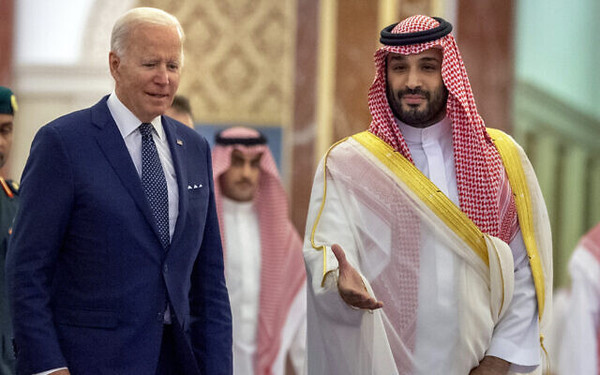
American President Joe Biden made his first trip to the Middle East from July 13th to 16th, visiting Israel and Saudi Arabia. On July 15th, Biden gave a fist bump to Saudi Crown Prince Mohammed bin Salman, who Biden accused of being behind the murder of a Saudi dissent journalist, Jamal Khashoggi. On the 16th, Biden attended the Gulf Cooperation Council held in Jeddah. The main purpose of President Biden’s visit to Saudi Arabia was to overcome the inflation crisis caused by rising oil prices. Due to the sudden rise in oil prices, the United States is suffering from massive inflation. Biden visited Saudi Arabia, an oil producing country, and hoped to secure a promise to increase oil production, which could lead to an easing of global supply pressures. However, Reuters, CNN and other major foreign media reported that the conferences were not successful. Let’s take a look at President Biden’s trip to the Middle East and the future prospects for US-Saudi relations.
History of Saudi Arabia – United States Relations

In 1939, Saudi Arabia successfully drilled a large oil field in Dammam. However, since the infrastructure for crude oil development was not yet established in Saudi Arabia, it received help from American oil companies. American oil companies started business in Saudi Arabia, and at this time the Arabia American Oil Company, commonly known as Aramco, was founded by the Standard Oil Co. of California (Chevron). Working with the United States, the Saudi royal family receives American capital, technology, and military assistance, and in return the United States takes control of the Saudi oil prices. According to data from EIA, Saudi Arabia's total cost of oil production per barrel was $10.35 as of June 2022, recording the lowest unit cost of production ever. Therefore, if Saudi Arabia cuts production, oil prices soar, causing a global economic chaos. Saudi Arabia is the head of the OPEC[1] member states, and the United States has the power to influence it. In addition, the US petrodollar system[2] has enabled the US to enjoy supremacy of the dollar not only at commodity goods markets, but also over the global economy for the past 40 years. Under the petrodollar system, countries have no choice but to use U.S. dollars to purchase oil, and the demand for the dollar has grown helping to maintain its value. Subsequently, the dollar was recognized as a reserved currency[3] at the Bretton Woods Conference in 1945. Because a reserved currency can be printed without depreciation, the dollar became one of the main sources that preserved the wealth of the United States. This signifies that Saudi Arabia has made a significant contribution to maintaining the reserved currency status of the dollar. However, an alliance rift is emerging in the Saudi-US relationship as the US has become the largest global oil producer due to the shale oil revolution[4]. Due to this, the size of the U.S. economy has drastic grown and the petrodollar has become obsolete since oil alone cannot sustain scale. Additionally, Saudi Arabia receives financial support from Russia and China, which are hostile to the United States, and this is also cited as a cause of worsening Saudi-US relations.
Reasons for the Sudden Rise in Global Oil Prices
There are two main reasons for the sudden rise in global oil prices: COVID-19 and Russia's Invasion of Ukraine. Since the COVID-19 pandemic, global trade has slowed, resulting in significant decline in oil demand and production. However, as the pandemic situation eased, global demand for crude oil soared. Therefore, the oil prices surged primarily because the supply of crude oil could not keep up with the demand. In addition, after Russia's Invasion of Ukraine, Western countries, including the United States, imposed severe economic sanctions on Russia, which also caused a surge in oil prices. According to a BBC article in July, the U.S. has banned all Russian oil and gas imports. Moreover, European Union (EU) leaders have agreed to embargo 90% of Russian oil imports into the bloc by the end of the year. Another CNN article from May reported that European Council chief Charles Michel tweeted: “Agreement to ban export of Russian oil to the EU. This immediately covers more than 2/3 of oil imports from Russia, cutting a huge source of financing for its war machine.” As such, the decrease in the supply of Russia, the world’s largest producer of natural gas and the world’s third biggest producer of crude oil, has had an impact on the drastic surge in global oil prices. Furthermore, as Russia’s gas cessation measures are gradually expanding due to the prolonged war, the pressure on slow economic growth coincide with rising inflation due to rising oil prices is also expected to accelerate.
Joe Biden’s Visit to Saudi Arabia

Why Biden Visited Saudi Arabia: Inflation Caused by Rise in Oil Price Is Spiking the United States.
According to the Consumer Price Index (CPI) for May released by the U.S. Department of Labor, the U.S. inflation rate rose 8.6% from the same month last year, experiencing the worst inflation in over 40 years since December 1981. In an article published in July, the New York Times emphasized the seriousness of the rise in oil prices, saying, “The average price of gasoline in the United States reached a record of just over $5 a gallon on July 14.” Moreover, NPR reported that Biden had faced his lowest approval rating since taking office, saying: “Biden’s approval rating in the poll is now at 36%” In order to overcome this hurdle, President Biden is trying to keep prices down, especially the price of crude oil. Biden has called for lower oil prices, including releasing oil from stockpiles and temporarily permitting trade in high-ethanol gasoline, which had been suspended due to environmental concerns. In addition, to stabilize the price of daily necessities, government’s measures such as restoration of supply chains and improvement of social overhead capital are being considered.
Relationship Between Biden and Saudi Crown Prince Mohammad bin Salman: Assassination of Jamal Khashoggi

In June, the US news website Axios announced “President Biden plans to visit Israel and Saudi Arabia in July […] Three Israel office told Axios Biden is expected to visit Israel and the Palestinian Authority on July 14 and 15 before traveling on to Saudi Arabia.” The main purpose was to overcome the inflation crisis caused by rising oil prices. After Crown Prince bin Salman was blamed by global society for the 2018 assassination of Saudi dissident journalist Jamal Khashoggi, President Biden has vowed to isolate Saudi Arabia from the international community. Biden spoke out to make Saudi Arabia a “global pariah” in a 2020 campaign trail pledge. Since Biden has strongly emphasized human rights in foreign relations, he has taken a critical position on this case. In 2021, after taking office, Biden declassified U.S. National Intelligence Service document stating that Crown Prince bin Salman had authorized Khashoggi’s assassination. In response, the Saudi Ministry of Foreign Affairs denied the Crown Prince’s involvement in the assassination, saying “This crime was committed by a group of individuals that have transgressed all pertinent regulations and authorities of the agencies where they were employed.” Since this incident, conflicts have continued over oil production, the Yemeni civil war, and the Iranian nuclear deal. In addition, despite the outbreak of the Ukraine war, Saudi Arabia has even shown cooperation with Russia over oil production while ignoring its ally, the United States. On March 15th, The Wall Street Journal reported “Saudi Arabia Considers Accepting Yuan Instead of Dollars for Chinese Oil Sales”. The dollar is in danger of losing its status as the key global currency, and the bilateral relations going sour.
Biden Coming Back from Saudi Arabia Empty Handed
On July 15th, at the Gulf Cooperation Council in Jeddah, President Biden said, “Let me state clearly that the United States is going to remain an active and engaged partner in the Middle East.” He declared that he would reconsider US influence in the Middle East by strengthening cooperation with Arabic countries in the Gulf region, including Saudi Arabia. At a presser after the conference, Biden conveyed that Saudi Arabia had agreed to increase oil production. The White House also released an explanatory note after the conference saying, “The United States has welcomed the increase in production levels 50% above what was planned for July and August.” Meanwhile, at the successive press conference, Saudi Foreign Minister Prince Faisal bin Farhan suggested that issues related to oil production will be decided by market logic within the OPEC+ coalition saying: “We listen to our partners and friends from all over the world, especially consumer countries. But at the end of the day, OPEC follows the market situation and will supply energy as needed.” Therefore, foreign presses evaluate that Biden’s expedition to Saudi Arabia didn’t achieve the goal to lower oil prices. Bloomberg wrote in an article in July, “After a closely-watched visit and a first-bump broadcast around the world, US President Joe Biden departed Saudi Arabia without a firm commitment on oil production.”
The United States and Saudi Arabia have a longstanding security relationship. However, the recent changes in the international situation following the assassination of Jamal Khashoggi have led to a sharp deterioration in relations between the two countries. In the midst of this, COVID-19 and the Russian Invasion of Ukraine caused oil prices to rise, and the world, including the United States, faced an inflation crisis. The US President Joe Biden met the Saudi Crown Prince despite the accusation of a fallback in human rights policy. However, experts evaluated that the intended diplomatic achievements, including the agreement to increase oil production, have not been achieved. Attention is focused on how President Biden failed his expeditions to the Middle East and his future plans for normalization of diplomatic relations and the soaring oil prices.
[1] An intergovernmental organization that controls petroleum production, supplies, and prices in the global market
[2] A global practice of exchanging oil for US dollars, rather than any other currency.
[3] A currency which is stable, does not fluctuate much, and provides the foundation for exchange rates for international transactions.
[4] A revolution that the United States succeeded in mining a large amount of shale oil, a natural gas, that enabled them to become the largest oil producer

